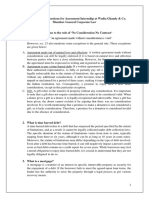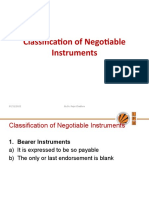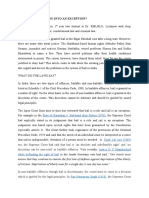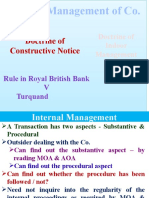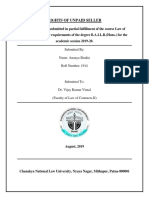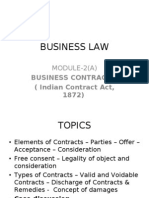0 ratings0% found this document useful (0 votes)
92 viewsBank 3
Bank 3
Uploaded by
kongtheiCopyright:
© All Rights Reserved
Available Formats
Download as PPTX, PDF, TXT or read online from Scribd
Bank 3
Bank 3
Uploaded by
kongthei0 ratings0% found this document useful (0 votes)
92 views29 pagesOriginal Title
Bank-3 (1)
Copyright
© © All Rights Reserved
Available Formats
PPTX, PDF, TXT or read online from Scribd
Share this document
Did you find this document useful?
Is this content inappropriate?
Copyright:
© All Rights Reserved
Available Formats
Download as PPTX, PDF, TXT or read online from Scribd
Download as pptx, pdf, or txt
0 ratings0% found this document useful (0 votes)
92 views29 pagesBank 3
Bank 3
Uploaded by
kongtheiCopyright:
© All Rights Reserved
Available Formats
Download as PPTX, PDF, TXT or read online from Scribd
Download as pptx, pdf, or txt
You are on page 1of 29
Madras Petrochem Limited and another v.
Board for Industrial and Financial
Reconstruction and others (2016) 4 SCC 1
• Brief Facts: Appellant 1 Company filed a reference u/S.15(1) of the
Sick Industrial Companies (Special Provisions) Act, 1985 before BIFR,
which was referred as BIFR case.
• After making an inquiry u/S.16(1) of the SICA, the appellant company
was declared sick and ICICI was appointed as the operating agency to
formulate a rehabilitation scheme.
• The first scheme prepared by the operating agency was sanctioned,
which envisaged the takeover of the appellant company by one
Mahavir Plantation Ltd
LETTERS OF CREDIT
UBS AG v. State Bank of Patiala
(2006) 5 SCC 416
• Brief Facts: The petitioner Bank, United Bank of Switzerland,
Lausanne, Switzerland, filed three separate summary suits against
State Bank of Patiala, Federal Bank and United Western Bank.
• Summons were issued to these defendants.
• The suits were filed in respect of various letters of credit, where the
terms and conditions were identical and the defenses taken were also
identical.
• The Bombay HC single judge granted unconditional leave to the
respondent banks to defend their respective suits.
• The facts in the three matters are more or less similar.
• On 27-3-98, on the request of its client, Hamco Mining & Smelting
Ltd., SBP issued an irrevocable letter of credit for a sum of US
$1,320,900 to the petitioner bank.
• The beneficiary was M/s Freobevia S.A.
• The LOC appears to have been issued for the import of 255 MT of tin
ingots by Hamco Ltd.
• On 30-3-98 the petitioner bank confirmed the said LOC, which was
to be valid till 23-9-98
• On 6-4-98, upon production of relevant documents by the
beneficiary, the petitioner bank made payment under the said LOC
to the said beneficiary, Freobevia S.A.
• Despite having made payment of the entire amount covered by the
LOC to the beneficiary, the petitioner bank agreed to the extension
of the maturity date of the LOC from 23-9-98 till 21-3-99.
• On 3-2-99, the advocate for the respondent Bank wrote to the
petitioner bank that the respondent bank had received information
that M/s. Hamco, M.s Frobevia and one Solo Industries, having its
offices in London and Sharjah, in connivance with other group
companies of Hamco had been perpetrating huge frauds on several
banks in India.
• It was also mentioned that from the enquiry undertaken, it was clear
that M/s Frobevia did not ship any goods on the vessel in question
and the bill of lading negotiated by M/s.Frobevia was fraudulent.
• By the said letter, the petitioner bank was informed further that the
respondent bank had been advised not to make any payment under
the above mentioned LOC dated 27-3-98.
• And the petitioner bank was put “on caution” and was advised not
to negotiate the export bills presented by Frobevia and further not to
make any payment to Frobevia in respect of the said LOC.
• Notwithstanding the aforesaid letter dated 3-2-99, the petitioner
Bank demanded remittance of the entire amount covered by the
LOC, which was due for payment on 21-3-99.
• The demand was not met.
• The petitioner bank wrote to the respondent bank of 7-4-99
indicating that documents presented by the beneficiary had been
negotiated and payments had already been made on 6-4-98 long
prior to the allegations of fraud indicated by the respondent bank.
• It was pointed out that irrespective of the said fact, under the
Uniform Customs and Practice for Documentary Credit, 500 (UCP
500) the respondent bank was under an obligation to reimburse on
the due date of the LOC, the amount already paid by the petitioner
bank to the beneficiary.
• Again request was made to remit the actual outstanding amount,
together with interest at the rate of 5.7%.
• Issue: Whether unconditional leave could have been granted to the
respondent banks to defend the suits filed against them by the
appellants bank?
• Observations:
• The LOC issued by the respondent bank requests the appellant bank
to advise the beneficiary that the respondent bank was established
an irrevocable LOC for 1,320,900 USD only.
• The LOC further indicates 20-6-98 as the expiry date for shipment
and 10-7-98 for negotiation in Switzerland.
• It was further stipulated that the documents for negotiation were to
be presented within 21 days from the date of the shipping
documents and were to be accompanied by the documents
evidencing shipment of 255 MT of tin ingots.
• In para 12 of the LOC it was particularly indicated that the credit was
subject to Uniform Customs and Practice for Documentary Credit.
• According to the appellant Bank, the beneficiary presented the
documents indicated by the LOC for negotiation to the appellant
bank on 6-4-98 and on the basis thereof the appellant bank made
payment and informed the respondent Banks accordingly.
• The respondent bank informed the appellant bank that the
beneficiary had agreed to extend the maturity date of the LOC from
23-9-98 to 21-3-99.
• The appellant was requested to confirm such extension.
• In response to the said communication, the appellant bank
confirmed the extension of the reimbursement date till 21-3-99.
• While considering the application filed by the appellant bank for
summary judgment, the HC took note of the fraud said to have been
perpetrated by Hamco group and that it was the case of the
Defendant bank that they had been defrauded by their constituent
in obtaining LOC.
• The HC took note of the submission made on behalf of the
defendant bank that it had come to its notice that the LOC has been
sought to be encashed without import of any goods, on the basis of
bogus documents used for obtaining the LOC and subsequent
encashment thereof were fraudulent.
• The learned single Judge also took note of the submission made on
behalf of the Plaintiff bank that since the LOC was a written
contract, on the date of maturity the defendant bank was bound to
honor the commitment made therein.
• The appellant bank paid over the amount to the beneficiary before
the respondent bank communication about the fraud.
• On consideration of the submissions made, it was taken the view
that the suit raises serious triable issues and in that view
unconditional leave was granted.
• The HC had completely misconstrued the law relating to LOC which
is sometimes referred to as the lifeblood of international commerce.
• The main contention of the appellant bank was that it had no
knowledge of any fraud before making payment under the LOC.
• Further, it had no knowledge of the fraud in regard to the bills of
lading and the LOC itself, it negotiated documents presented before
it by the beneficiary and made payment accordingly as per the
instructions of the respondent bank.
• The appellant bank counsel referred to the relevant provisions of
UCP 500, and in particular 14 thereof, which deals with
reimbursement on negotiation of documents presented to the
confirming bank on the instructions of the issuing bank.
• It was argued that the respondent bank had no defense since no
triable issues arise in the suits as filed.
• The stand taken on behalf of the R was that the A could claim
reimbursement only on the due date of payment as stipulated in the
LOC agreed upon between the issuing bank and the confirming bank.
• It was urged that since the fraud committed by Hamco had been
discovered and intimated to the A before the due date of
reimbursement, the R was entitled to withhold payment under the
LOC.
• Mr.R.F.Nariman, appearing for the R contended that whether
payment had at all been made by the A to the beneficiary under the
LOC before being informed of the fraud perpetrated by Hamco.
• It was contended that except for intimation that the documents
presented by the beneficiary had been negotiated by the A, there
was nothing else on record to indicate the payment had been made
on 6-4-98, the same date on which the documents were presented
for negotiation.
• It was submitted that the Court would have to consider whether the A
had satisfied itself about the genuineness of the documents presented
and had obtained confirmation from the R before making payment to
the beneficiary of the LOC.
• In fact, if any payment made by the A to Frobevia may have been under
some private agreement and not under the LOC.
• It was contended that it was sufficient to indicate to the Court before
which a suit was pending, then there was a triable issue for which leave
to defend the suit was required to be given.
• It was urged that the defense was not required to show that it would
inevitably succeed in the suit, but that a plausible defense, capable of
being tried, was sufficient to grant leave to a defendant to defend a suit
of this nature.
• The principle in such matters was to grant leave to a defendant to defend
a suit if there was the slightest possibility of a triable defense.
• Mr.Nariman submitted that no civil right of the A had been
adversely affected by grant of such leave and that as far as the A
was concerned, the suits filed by it remained as the defendants
would only get an opportunity to defend the same.
• On consideration of the submissions made on behalf of the
respective parties, we are unable to agree with the submissions
advanced on behalf of the R in these appeals.
• While the principles indicated by Mr. Nariman u/O 37 of the CPC are
undoubtedly sound, in the facts of this case, however, no triable
issue can be raised which would warrant grant of unconditional
leave to the R to defend the suit filed by the A.
• International commerce operates on trust and relies to a large
extent on arrangements between banks on behalf of their respective
clients, giving rise to “UCP 500” which governs the LOC involved in
the instant case.
• The facts these three appeals are clear and simple.
• The LOC were issued by the issuing bank to the confirming bank with a
request to inform the beneficiary that an irrevocable LOC had been
established for the sum indicated therein to be paid by the appellant
bank on negotiation of documents to be presented by the beneficiary.
• Such documents having been presented by the beneficiary to the A
Bank, it make payment under the LOC to the beneficiary and was
entitled to receive reimbursement for the same from the R Bank.
• If the fraud had been detected ealier and the A Bank had informed of
such fraud and put on caution prior to making payment, the R bank may
have had a triable issue to go to trial.
• That is not so in these three cases.
• In these cases, the fraud was detected after the LOC had been
negotiated and hence such fraud alleged to have been committed by the
constituent of the R bank cannot be set up even as a plausible defense
in the suit filed by the A bank.
• Conclusion: The LOC itself shows that the same was to be negotiated
as had been done by the A bank.
• As far as the submission regarding the maintainability of the appeals
is concerned, we are satisfied that the principles enunciated in
Babulal Khimji case which apply to letter patent appeals, will not
apply to appeals for which special leave is grnted u/Art 136 of the
Constitution.
• In such circumstances, these appeals succeed and are allowed.
• The judgment and order of the HC in these three appeals are set
aside and the unconditional leave granted to the R bank to defend
the suit is revoked.
Federal Bank Ltd v. V.M.Jog Engineering
Ltd and others (2001)1 SCC 663
• Brief Facts: The Federal Bank was the 3rd defendant in the suit and
has a branch at Pune.
• The matter relates to a LOC issued by the 2nd defendant, Bank of
Maharashtra, Pune at the instance of the plaintiff buyers Jog
Engineering co, Pune.
• The sellers are Jaswant Steel, Nagpur (1st Defendant/1st respondnt).
• The Federal Bank was the negotiating bank while the Bank of
Maharashtra was the issuing bank.
• The FB received documents from the sellers which included five
delivery challans purportedly signed by the buyers’ officers
acknowledging receipt of goods.
• The sellers sent a B/E for encashment against the LOC for 2 crores, taken
out by the buyers.
• The FB sent the B/E, with endorsement of the buyers and the LOC and
the connected documents including the “delivery challan”- as received
from the seller- to the issuing bank and got the genuineness of the
documents confirmed.
• The Negotiating Bank then released about Rs. 2 crores in favor of the
sellers after deducting the commission.
• But the buyers have obtained a Temporary injunction against the Issuing
Bank from honoring the LOC.
• This has resulted in the appellant Negotiating Bank not being able to
obtain reimbursement from the issuing bank.
• The trial Court and the HC, after noting that the Negotiating Bank had
released to the seller the above sum upon due certification of the
seller’s documents by the Issuing Bank- have thus precluded the NB
from getting reimbursement from the issuing bank.
• One other peculiar feature of the case is that while the appellant NB
was impleaded as the 3rd defendant in the suit, specific relief was
not sought against it either in the suit or in the interlocutory
application.
• In fact, it was stated by the plaintiff purchaser that the NB need not
be heard in the interlocutory application and that the said bank had
no locus standi.
• Both the courts below thought it fit to accept this contention and
grant injunction u/O 39 R 1 of the CPC restraining the Issuing bank
from paying any amount to anybody under the LOC, pending suit.
• In the plaint or in the IA, the plaintiff has not alleged “fraud” or
forgery against the NB nor even the knowledge of the fraud/forgery
which is alleged against the sellers in respect of the delivery challan.
• Allegations of fraud and forgery were made only against the sellers.
• In the IA, though injunction was prayed for against the issuing bank,
the Negotiating bank was not brought into the array.
• The appellant had obtained, by way of caution, the confirmation
from the issuing bank as per banking practice in regard to the
genuineness of the endorsements on the bill of exchange and LOC
and on the documents produced by the sellers and the issuing bank
had confirmed the genuineness and had promised to reimburse.
• It is contended that the primary duty to verify the documents was
that of the Negotiating Bank and that the confirmation obtained
from the Issuing bank was of no value.
• Issues: The following points arise for consideration in this appeal:
1. In the context of the need for Banks to take reasonable care to
scrutinize the documents produced before it for honoring the LOC, what
is the relevance of the UCP code issued by the International Chamber of
Commerce, which was here expressly incorporated in the LOC?
2. If it is the case of the plaintiff buyer that there is “fraud” on the part of
the sellers in relation to the documents and if it is not its case that the
Negotiating Bank was guilty of fraud or had knowledge of fraud by the
seller, could the Negotiating Bank not seek reimbursement from the
Issuing Bank, as a holder in due course of the bill of exchange, against
the LOC?
3. Whether, once the Issuing Bank had certified the documents which
were presented to the NB by the sellers, the said Bank could turn round
and refuse reimbursement on the ground that on further scrutiny made
by it – long after the NB parted with monies – was not correct or was
mistaken?
• Observations:
• The Uniform and Practices for Documentary Credits states that
“general provisions and definitions and the Articles following are to
apply to all documentary credit and binding upon all parties thereto,
unless otherwise expressly agreed”.
• UCP states that it shall be deemed incorporated into each
documentary credit if there are words in the credit indicating that
such credit was issued subject to UCP.
• It has been formulated by the International Chamber of Commerce.
• It was result of necessity and the need for use of banks as agents in
international trade.
• It must be recognized that UCP terms do not constitute a statutory
code.
• They constitute a formulation of customs and practices, which the
parties to a LOC can incorporate into their contracts by reference.
• If it is found that the parties have explicitly agreed to such term,
then the search need go no further, since any contrary provision in
UCP must yield to the parties ‘expressed intention’.
• U/Art.15 it states that “Banks must examine all documents with
reasonable care to ascertain that they appear on their face to be in
accordance with the terms and conditions of the credit.
• Documents which appear on their face to be inconsistent with one
another will be considered as not appearing on their face to be in
accordance with the terms and conditions of the credit”.
• The issuing bank shall have reasonable time in which to examine the
documents and to determine as above whether to take up or to
refuse the documents.
• If the issuing bank does not return them within reasonable time, it
may be deemed that it has ratified the genuineness of the
documents.
• In deciding whether the time taken is reasonable or not, English Courts
used to take into account banking practice, the Banks in England
normally used to take three days.
• The UCP is not comprehensive as it does not address itself to the effect
of fraud or illegality in the documentary credit arrangement.
• In regard to 2nd issue, it has been held that courts out not to grant
injunction to restrain encashment of bank guarantees or LOC.
• Two exceptions have been mentioned – (i) fraud, and (ii) irretrievable
damage.
• If the plaintiff prima facie able to establish that the case come within
these two exceptions, temporary injunction u/O39 R1 CPC can be
issued.
• It has also been held that the contract of the bank guarantee or the LOC
is independent of the main contract between the seller and the buyer.
• In case of an irrevocable bank guarantee or LOC the buyer cannot
obtain injunction against the banker on the ground that there was a
breach of the contract by the seller.
• If the bank is satisfied on the face of the documents that they are in
conformity with the list of documents mentioned in the bank
guarantee or LOC and there is no discrepancy, it is bound to honor the
demand of the seller for encashment.
• While doing so it must take reasonable care.
• It is not permissible for the bank to refuse payment on the ground that
the buyer is claiming that there is a breach of contract.
• Nor can the bank try to decide this question of breach at that stage
and refuse payment to the seller.
• Its obligation under the document having nothing to do with any
dispute as to breach of contract between the seller and the buyer.
• As to its knowledge of fraud or forgery, we shall presently deal with it.
• Decided cases hold that in order to obtain an injunction against the issuing
bank, it is necessary to prove that the bank had knowledge of the fraud.
• If the Federal Bank was merely a Collecting Bank or agent which had
approached the Bank of Maharashtra (the issuing Bank)
• and if the Issuing bank was sought to be restrained by the buyer before
payment was made by the Issuing Bank to the Collecting Bank, the
Collecting Bank could not have compelled the Issuing Bank to release the
money for collection if the buyer informed his bank in his plaint that the
documents to be presented to it by the collecting bank were forged or
fraudulent.
• But, the Negotiating Bank (FB), has said on the basis of clearance given by
the IB as to genuineness of documents, and seeks reimbursement, then
the FB is in the position of a holder in due course and can claim that that
the suit of the buyer must fail if it sought to restrain the IB from
reimbursing the Negotiating Bank.
• The contract between the issuing banker and the paying or
negotiating banker may partake of a dual nature.
• The relationship is mainly that of principal and agent, mandatory
and mandatory.
• In order that he may claim reimbursement for any payment he
makes under the credit or the indemnity of an agent, the
intermediary banker must obey strictly, the instructions he receives,
for by acting on them, he accepts them and thus enters into
contractual relations with the issuing bank.
• There is ordinarily no privity between the intermediary banker and
the buyer.
• But the intermediary banker, though initially the agent of the issuing
bank, may also act as principal in relation to him.
• Conclusion: The rights of negotiating bank are partly based on the law
relating to negotiable instruments and partly on the law applicable
strictly to LOC.
• So far as the rights of the negotiating banker against the seller are
concerned, his position will that as in the case of a “bill of exchange” as
against the drawer.
• Generally the risks of the negotiation bank in cases of revocable credits.
• But, so far as irrevocable credits are concerned, that the terms of the
credit have to be looked into.
• Some terms indeed contain an undertaking by the issuing bank with
the seller and purchaser for value of drafts on credits, to honor those
drafts if the terms of the credit are complied with.
• Prima facie, the appellant was in the position of a holder in due course.
• Points 2 and 3 are decided in favor of the appellant.
You might also like
- Essential Soft Skills for Lawyers: What They Are and How to Develop ThemFrom EverandEssential Soft Skills for Lawyers: What They Are and How to Develop ThemNo ratings yet
- Question: Samuel Was A Promoter of A Company Called Edmanuals Pty LTDDocument1 pageQuestion: Samuel Was A Promoter of A Company Called Edmanuals Pty LTDKarigor PrintinghouseNo ratings yet
- SC Judgement On Only Gross Negligence by An Advocate, Would Amount To Professional Misconduct PDFDocument15 pagesSC Judgement On Only Gross Negligence by An Advocate, Would Amount To Professional Misconduct PDFLatest Laws TeamNo ratings yet
- The Andhra Pradesh Emmar ScamDocument4 pagesThe Andhra Pradesh Emmar ScamKiran Kumar Kanduri0% (1)
- Opening Accounts of Various Types of CustomersDocument26 pagesOpening Accounts of Various Types of CustomersnayanPatel4677No ratings yet
- Written Interview Questions - Wadia GhandyDocument7 pagesWritten Interview Questions - Wadia Ghandyshantanu.shimpi220No ratings yet
- Presentation On Company Law - by J.i.nwatuDocument6 pagesPresentation On Company Law - by J.i.nwatuiykeinana100% (1)
- Divorce Petition.Document4 pagesDivorce Petition.vallaryborse144No ratings yet
- Case Comment On Ramesh Kumar Agarwal V. Rajmala EXPORTS (P) LTD., AIR 2012 SC 1887 6.1 Code of Civil Procedure & Law of LimitationDocument11 pagesCase Comment On Ramesh Kumar Agarwal V. Rajmala EXPORTS (P) LTD., AIR 2012 SC 1887 6.1 Code of Civil Procedure & Law of LimitationVaishnavi Murkute0% (1)
- Classification of Negotiable InstrumentsDocument22 pagesClassification of Negotiable InstrumentsAnmol Raj SharmaNo ratings yet
- Taj Mahal Hotel Vs United India Insurance Company Ltd.Document55 pagesTaj Mahal Hotel Vs United India Insurance Company Ltd.prabjot.bhullarNo ratings yet
- L16 ProspectusDocument9 pagesL16 ProspectusSagar MurtyNo ratings yet
- The Chairman, SEBI v. Shriram Mutual Fund & Anr. (2006) 5 SCC 361Document18 pagesThe Chairman, SEBI v. Shriram Mutual Fund & Anr. (2006) 5 SCC 361DEV PORUS SURNo ratings yet
- Legal Position of Directors - As Agents, Trustees, Organs of The CompanyDocument7 pagesLegal Position of Directors - As Agents, Trustees, Organs of The CompanyShrutiNo ratings yet
- Arvind Mills InternshipDocument10 pagesArvind Mills InternshipKartik SinghNo ratings yet
- The General Insurance Business (Nationalization) Act, 1972 A Critical AnalysisDocument8 pagesThe General Insurance Business (Nationalization) Act, 1972 A Critical AnalysisRishabh Patel100% (1)
- Khan Gul V - S Lakha Singh (Lahore 1928)Document5 pagesKhan Gul V - S Lakha Singh (Lahore 1928)GAURAV YADAVNo ratings yet
- Afzal V State of Haryana PDFDocument3 pagesAfzal V State of Haryana PDFAnonymous 6HkkKJwnNo ratings yet
- Role of Intermediaries in Primary MarketDocument24 pagesRole of Intermediaries in Primary MarketAmit Kumar (B.Sc. LLB 15)No ratings yet
- Court Reconfirms That Legal Heirs Are Preferred Over NomineesDocument3 pagesCourt Reconfirms That Legal Heirs Are Preferred Over NomineesRamesh Babu TatapudiNo ratings yet
- Goa Succession Special Notaries and Inventory Act, 2012Document82 pagesGoa Succession Special Notaries and Inventory Act, 2012Mini AgarwalNo ratings yet
- Suit by Indegent Person.Document4 pagesSuit by Indegent Person.Śańthôsh Ķūmař PNo ratings yet
- Borrowing PowersDocument11 pagesBorrowing PowersSaptak RoyNo ratings yet
- Topa LicenseDocument21 pagesTopa LicenseBaViNo ratings yet
- Bail: A Rule Turning Into An Exception?: State of Rajasthan v. Balchand Alias Baliya (1978)Document4 pagesBail: A Rule Turning Into An Exception?: State of Rajasthan v. Balchand Alias Baliya (1978)Priyanshi BhageriaNo ratings yet
- Internal Management of Co.: Doctrine of Constructive NoticeDocument57 pagesInternal Management of Co.: Doctrine of Constructive NoticegauravNo ratings yet
- Tehseen Poonawalla SynopsisDocument12 pagesTehseen Poonawalla SynopsisShashwat Srivastava0% (1)
- Binoy Kumar Sahas RoyDocument23 pagesBinoy Kumar Sahas RoyAnkitaSinghNo ratings yet
- Dai-Ichi Karkaria Private LTD., Bombay vs. Oil and Natural GasDocument36 pagesDai-Ichi Karkaria Private LTD., Bombay vs. Oil and Natural GasAmartya ChoubeyNo ratings yet
- Analysis of R Lilawati V Bank of BarodaDocument11 pagesAnalysis of R Lilawati V Bank of BarodatydruckerNo ratings yet
- Piramal Healthcare Limited vs. Diasorin S.P.A.: FactsDocument5 pagesPiramal Healthcare Limited vs. Diasorin S.P.A.: FactsRameshwari RaoNo ratings yet
- Rights of Unpaid Seller: Submitted By: Name: Ananya Shukla Roll Number: 1914Document21 pagesRights of Unpaid Seller: Submitted By: Name: Ananya Shukla Roll Number: 1914Ananya ShuklaNo ratings yet
- Annada Mohan Roy Vs Gour Mohan Mallik AIR 1923 PC 189: Section 6 (A)Document6 pagesAnnada Mohan Roy Vs Gour Mohan Mallik AIR 1923 PC 189: Section 6 (A)Utkarsh SinghNo ratings yet
- Case Analysis On SUSHIL KUMAR SHARMA V. UNION OF INDIA AIR 2005 SC 3100Document5 pagesCase Analysis On SUSHIL KUMAR SHARMA V. UNION OF INDIA AIR 2005 SC 3100Swadhin Mohan MohapatraNo ratings yet
- Banking FDDocument17 pagesBanking FDKumar SouravNo ratings yet
- Ans 2 - (A) - Section 11 and Section 12 of The Hindu Marriage Act, 1955 Provides The Decree ofDocument6 pagesAns 2 - (A) - Section 11 and Section 12 of The Hindu Marriage Act, 1955 Provides The Decree ofSankalp PariharNo ratings yet
- SC Tells Courts Not To Interfere in NPA Recovery Actions - Analysis of SC Ruling United Bank of India vs. Satyawati TondonDocument3 pagesSC Tells Courts Not To Interfere in NPA Recovery Actions - Analysis of SC Ruling United Bank of India vs. Satyawati TondonNidhi BothraNo ratings yet
- Legality of Object & ConsiderationDocument26 pagesLegality of Object & Considerationjjmaini13100% (1)
- PRACTICAL TRAINING - II Alternate Dispute ResolutionDocument43 pagesPRACTICAL TRAINING - II Alternate Dispute Resolutionrajesh100% (1)
- Renusagar Power Company Vs General Electric CompanyDocument7 pagesRenusagar Power Company Vs General Electric Companydivyanshi pathakNo ratings yet
- In Re David Payne & CoDocument11 pagesIn Re David Payne & CogauravNo ratings yet
- C.C. Alavi Haji v. Palapetty MuhammedDocument2 pagesC.C. Alavi Haji v. Palapetty MuhammedATHENASNo ratings yet
- Model PilDocument14 pagesModel PilKalpana GundumoluNo ratings yet
- Transfer of Property Act, 1st ConsultationDocument22 pagesTransfer of Property Act, 1st ConsultationbhNo ratings yet
- DPC Research ProjectDocument30 pagesDPC Research ProjectDheeraj JangidNo ratings yet
- Contract-II Case Review Of: Maharashtra National Law University, AurangabadDocument9 pagesContract-II Case Review Of: Maharashtra National Law University, AurangabadSaurabh Krishna SinghNo ratings yet
- Temporary Injunction-Sample and FactsDocument4 pagesTemporary Injunction-Sample and FactsSHUSHRUT DEVADIGANo ratings yet
- Rajesh vs. NehaDocument4 pagesRajesh vs. NehakkratikakhatriNo ratings yet
- Transfer of PropertyDocument5 pagesTransfer of PropertyVishrut KansalNo ratings yet
- S. 27. Court Assistance in Taking EvidenceDocument16 pagesS. 27. Court Assistance in Taking Evidencemohd sakibNo ratings yet
- Debenture Certificate 380Document2 pagesDebenture Certificate 380girivalamsupermarketNo ratings yet
- Yunis Alias Kariya, Etc. v. State of Madhya Pradesh, AIR 2003 SC 539Document6 pagesYunis Alias Kariya, Etc. v. State of Madhya Pradesh, AIR 2003 SC 539nishi jainNo ratings yet
- Before The Hon'Ble Supreme Court of Odisha: Internal Assignment Madhusudan Law University, CuttackDocument17 pagesBefore The Hon'Ble Supreme Court of Odisha: Internal Assignment Madhusudan Law University, CuttackRISHITA RAJPUT SINGHNo ratings yet
- Case Analysis: Karanataka Power Transmission Corportion V Ashok Iron Works Private LimitedDocument6 pagesCase Analysis: Karanataka Power Transmission Corportion V Ashok Iron Works Private LimitedRemya RubinNo ratings yet
- Assignment: Extent of Judicial Intervention in ArbitrationDocument6 pagesAssignment: Extent of Judicial Intervention in ArbitrationSankarSinghNo ratings yet
- R D Saxena Vs Balram Prasad SharmaDocument2 pagesR D Saxena Vs Balram Prasad SharmaR.k.p SinghNo ratings yet
- Wipro Social Audit System - LalsivarajDocument4 pagesWipro Social Audit System - LalsivarajLalsivaraj SangamNo ratings yet
- Case Comment On The CaseDocument6 pagesCase Comment On The Casevikalp wangeNo ratings yet
- Ifim Business Law m2Document129 pagesIfim Business Law m2Mv vinodkumar100% (2)
- Investigation into the Adherence to Corporate Governance in Zimbabwe’s SME SectorFrom EverandInvestigation into the Adherence to Corporate Governance in Zimbabwe’s SME SectorNo ratings yet
- Premenstrual SyndromeDocument13 pagesPremenstrual SyndromekongtheiNo ratings yet
- For Exam PurposeDocument15 pagesFor Exam PurposekongtheiNo ratings yet
- Evolution and Development of Banking System in IndiaDocument8 pagesEvolution and Development of Banking System in IndiakongtheiNo ratings yet
- Schools of CriminologyDocument38 pagesSchools of Criminologykongthei100% (1)





